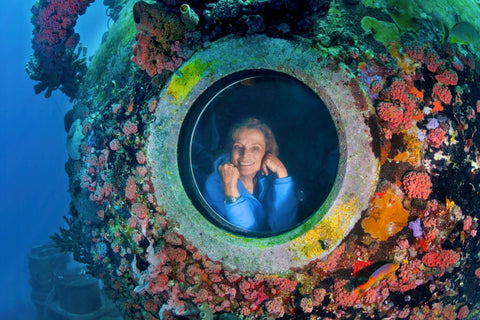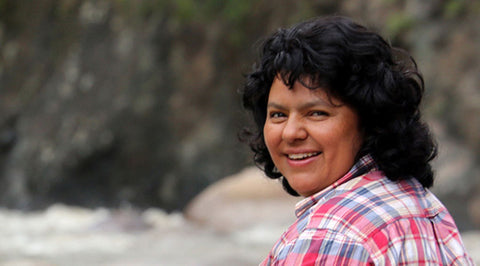International Women's Day is observed globally. On this day, Bamboa honours and shares the work of 16 trailblazing women who have impacted the world and are guardians of our planet.
Bamboa founder Julia Washbourne came from Germany to Hong Kong in 2005 as a purchasing manager for a renowned mail-order company. Her work exposed her to issues of pollution, waste, and labour exportation that plague global supply chains. She discovered the endless benefits of bamboo and launched Bamboa in 2008, an established eco-friendly home and lifestyle brand. Julia is also an environmentalist, an animal lover, and enjoys many different ocean sports.
Bamboa has always been passionate about pioneering green trends and ensuring that products are environmentally sound. It empowers women, and supports green development in rural communities as bamboo is a fundamental source of income for smallholder farmers in several countries in Asia.
Aware of climate change hazards, Bamboa introduced the Grow Bamboo Initiative, a bamboo plantation project in Asia. It is one of many ways it, as a luxury brand, offers value to the planet.
Bamboa believes in optimizing environmental involvement to make better choices. Even if initially small, changes can make incremental improvements in the environment.
As we celebrate Women's Day, we honour 16 incredible women who have worked to protect the planet, its creatures and the environment.
From groundbreaking primatologists to deep-sea explorers, these women have changed the world and our role in protecting it. From the grass-root levels to international policy, we can impact this world by spreading awareness.
Read the stories of 16 remarkable women and their contributions to making a greener and healthier world. Bamboa recognises the value that women bring to individual communities and collectively to the world.
************************************************************************************************

Anna Botsford Comstock (1854 - 1930)
(USA) was a skilled illustrator, writer, and educator. Her love for nature led her to become a natural science artist and educator. She was the first female proponent of nature education at Cornell University, Ithaca, New York.

Kate Sessions (1857 - 1940)
(USA) spent most of her childhood living in and around the towering trees of northern California. In 1881, she was the first woman to graduate from the University of California with a science degree. After starting her horticultural career with a nursery in 1885, Sessions arranged to lease 30 acres of land in City Park (now called Balboa Park) from the city, in exchange for planting 100 trees a year in the barren park and 300 trees a year in the rest of San Diego.

Rosalie Barrow Edge (1877 - 1962)
(USA) developed an interest in birdwatching in the 1920s. Edge was horrified to discover that 70,000 bald eagles were being slaughtered in the Alaskan Territory, but that existing conservation groups didn't care because bald eagles weren't rare at the time. She founded the Emergency Conservation Committee, which was dedicated to protecting all species of birds and animals, common and rare alike.

Marjory Stoneman Douglas (1890 - 1998)
(USA) When Marjory Stoneman Douglas moved to Miami as a young woman, the Everglades were considered a worthless swamp, but the budding journalist saw something different: a vibrant web of ecosystems, worthy of protection, that provided much of Florida's clean water. "Without her ongoing activism, the Everglades would likely have died forever after large sections were either drained or contaminated.

Margaret Thomas Murie (1902 - 2003)
(USA) The naturalist, author, and adventurer spent nearly 40 years studying wildlife with her husband, Olaus, on backcountry expeditions in Alaska and Wyoming. In 1956, the couple started a campaign to protect some of Alaska's at-risk natural territory. They were instrumental in getting the government to set aside eight million acres as the Arctic National Wildlife Refuge, which they could double in size in later years. She also took the lead in enabling the passing of the Wilderness Act, which today protects over 100 million acres.

Rachel Carson (1907 - 1964)
(USA) When American marine biologist Rachel Carson published Silent Spring, widely considered one of the twentieth century's most influential works of non-fiction, she didn't just call attention to the dangers of indiscriminate use of synthetic pesticides; she also helped launch the modern environmental movement. She stood strong against intense criticism from the chemical industry. Within a few years, the Nixon Administration formed the Environmental Protection Agency.

Dian Fossey (1932 - 1985)
(USA) Dian Fossey broke new ground for female biologists in the field when she set out to study the mysterious mountain gorillas of Rwanda. But as Fossey identified and catalogued many new aspects of gorilla behavior, she also saw the brutality of poaching firsthand. Fossey and her colleagues devoted significant attention to anti-poaching activities, including running poaching patrols, destroying poachers' traps, pressuring local authorities to enforce anti-poaching laws, and helping arrest poachers. Tragically, Fossey was killed in her cabin in the Virunga Mountains of Rwanda in December 1985.

Jane Goodall (b. 1934)
(UK) The British primatologist is considered the world's foremost expert on chimpanzees after her 55-year-long study on wild chimpanzees in Gomber Stream National Park in Tanzania. She's also a dedicated advocate and activist for animal welfare and conservation causes. Her years of research and work with chimpanzees has proved that "we're not as different from the rest of the animal kingdom as we used to think." Today, the Jane Goodall Institute works worldwide with people to develop greater understanding of how we can help humanity while still protecting the natural world.

Sylvia Earle (b. 1935)
(USA) This groundbreaking American marine biologist and oceanographer set a women's depth record for suit diving and has helped design research submarines. Still, she is best known for her advocacy for protecting oceans. In 2009, she used money from a TED Prize to found Mission Blue, a non-profit organisation, dedicated to creating protected marine preserves worldwide.

Wangari Maathai (1940 - 2011)
(Kenya) After completing her education in the US, Wangari Maathai returned to Kenya, with a new perspective on the environmental damage in her country and the need for women's rights. She founded the Green Belt Movement to tackle both by teaching Kenyan women to plant new trees in deforested areas and sustainably draw income from the land. Since then, the movement has trained 30,000 women in trades to raise them out of poverty and have planted over 51 million trees. She was the first African woman to receive the Nobel Peace Prize in 2004.

Biruté Galdikas (b. 1946)
(Canada) Biruté Galdikas set up a research project at a reserve in Borneo. Galdikas not only revolutionized our understanding of this little-known primate, but she also became an advocate for the protection of the orangutan's rainforest home, which was rapidly being destroyed by logging. She created a center dedicated to rehabilitating captured orangutans with the hope of reintroducing them to the wild. She still speaks passionately about the importance of protecting natural spaces worldwide.

Winona LaDuke (b. 1959)
(USA) Native American activist Winona LaDuke saw the potential for a new model of sustainable development and locally-based, environmentally conscious production of everything from food to energy. Her non-profit venture, the White Earth Land Recovery Project, has revived the cultivation of wild rice in Minnesota and it sells traditional foods under its label Native Harvest. She's also the co-founder of Honor the Earth, a Native-led organisation that provides grants to Native-run environmental initiatives.

Erin Brockovich (b. 1960)
USA) Erin Brockovich was working as a law clerk — with no formal education in law — when she became instrumental in building a significant case against the Pacific Gas and Electric Company (PG&E) for groundwater contamination in Hinckley, California. In 1993, Brockovich started investigating the illnesses, and her careful work resulted in a $333 million settlement in 1996. Brockovich has since led other suits relating to chromium-6 contamination and creates awareness about the dangers of chromium-6 and mould contamination.

Berta Isabel Cáceres Flores (1971 - 2016)
(Honduras) A member of the Lenca people of Honduras, Berta Isabel Cáceres Flores, founded the Council of Popular and Indigenous Organisation of Honduras (COPINH) to tackle illegal logging and the environmental destruction caused by plantations and dams. Tragically, in 2016, Cáceres was assassinated in her home, yet another casualty in one of the world's most dangerous countries to be an environmental activist.

Isatou Ceesay (b. 1972)
(Gambia) Like many girls in Gambia, Isatou Ceesay was forced to drop out of school at a young age. In 1997, Ceesay founded the Njau Recycling and Income Generation Group. This revolutionary community recycling initiative turns waste into wealth: women collect the recyclable materials and bring them to a center where they separate the plastics and upcycle them into bags, mats, purses, and more. Over 100 women gain income thanks to Ceesay's organization. She also runs a buy a bag site OnePlasticBag.com.

Greta Thunberg (b. 2003)
(Sweden). Swedish teenager Greta Thunberg is leading a new generation of environmental activists! In 2018, at the age of 16, Greta founded the skolstrejk for climate (school strike for climate) movement after learning about the dangers posed by climate change. Although Greta faces online bullying over her appearance, her diagnosis of Asperger's syndrome, and more, she is also winning accolades around the globe, including nomination for the Nobel Peace Prize.
*******************************************************************************************
These dedicated women changed the world for nature lovers, animal activists and preservationists. Our best memories of visiting green spaces and forests are because of their relentless commitment and resolute efforts. They struggled to get natural habitat preserved for animals, especially rare species.
What better way for Bamboa to celebrate International Women's Day than by acknowledging women who are working tirelessly towards achievements in environmental advocacy. Let’s follow their footsteps and pledge to make a positive change for future generations.
